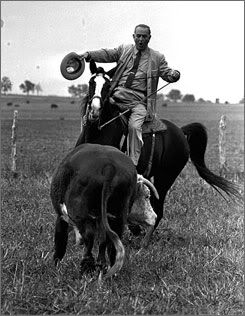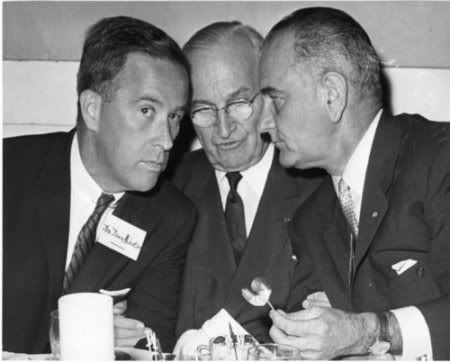Asalto: It's okay. Instead of North Korea and East Germany, this Cold War gets divided China and shattered Congo.
----------------------------------------------------------------------------------------------------------------------------------
Out of the Gate
In 1940, Scoop Jackson was a twenty-eight-year-old prosecuting attorney who decided to run for Congress after learning that the Democratic Representative of Washington’s Second Congressional District was retiring after four terms. Scoop sought and won the nomination to succeed the retiree on the November ballot. The headline Democrat on that ballot was President Franklin D. Roosevelt, who was seeking an unprecedented third term in office as a reaction to Nazi Germany overrunning the Low Countries/France and launching an aerial campaign against Great Britain. Although Jackson won his Congressional race that November and Washington went blue, FDR came up short and narrowly lost to the “peace through strength” rhetoric of his Republican challenger Wendell Willkie. Upon taking office in January 1941, Willkie appointed moderate Alf Landon – FDR’s G.O.P. opponent in 1936 whose lackluster campaign netted him a paltry eighteen electoral votes – to the post of Secretary of the Treasury and assigned him the task of planning a partial rollback of the New Deal. A staunch admirer of Roosevelt and his approach to generating economic growth, Jackson opposed the Landon Plan's cuts but was unable to prevent the pro-business Administration from eliminating certain parts of the New Deal such as the Tennessee Valley Authority. On the other hand, Scoop was pleased to see the Republicans preserve and even expand other programs like Social Security and the Federal Deposit Insurance Corporation. As Vice President in the late 1950s, the man from Everett thought of a new set of domestic proposals to serve as the spiritual successor to the New Deal. In January 1960, he unveiled his plan for moving the country forward: the Fair Deal. Of course, making the Fair Deal a reality meant Jackson had to be elected President first.
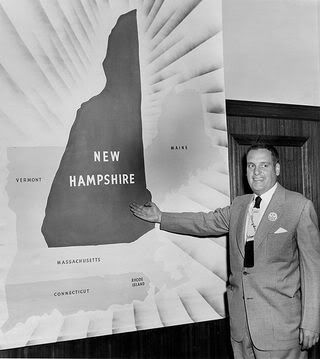
Like any other candidate seeking the highest office in the land, the Vice President’s journey began in the snowy mountains of New Hampshire. Since 1920, The Granite State and her “Live Free or Die” inhabitants were the first to cast their primary votes for President. Although New Hampshire’s minuscule number of electoral votes makes the state a minor player in the general election, her major importance is setting the tone for the primary process to follow. Presidential candidates swarm the state to meet voters and gauge how well they might do going forward. A decisive win here can generate positive publicity and give a candidate what 1980s G.O.P. winner George H.W. Bush called
“Big Mo”.
Winning New Hampshire gave Bush’s campaign momentum – along with an injection of funding – and set him on the path to eventually gaining his Party’s nomination. Of course, it doesn’t always work out that way. In 1952, Republican Dwight D. Eisenhower and Democrat Estes Kefauver both won New Hampshire but failed to win the nomination for one reason or another. Four years later, Republican Sherman Adams won as well but eventually got knocked out by Lodge (who received the nomination instead). By these examples, New Hampshire isn’t exactly a reliable indicator of who will ultimately become the nominee. That didn’t deter Jackson from criss-crossing the state ahead of the March 8th primary. The Vice President, who performed best with small crowds and thus felt comfortable in New Hampshire, faced only one major opponent: Senator Byrd. With his internationalism and pay-as-you-go fiscal policy, Byrd had a couple things going for him and could’ve seen some degree of success here. Unfortunately for him, his good qualities were overshadowed by the fact that he had the endorsement of the Dixiecrats. Ironically, the support he got from Strom Thurmond greatly hindered the Senator’s mainstream appeal because average voters who might otherwise have given Byrd a serious look saw the Dixiecrats behind him and wrote him off as a regional candidate – not someone with national appeal. The conditions which allowed both Sparkman and Richard Russell, Jr. to transcend their Southern roots and be viable candidates throughout the country were absent in Byrd’s case and that would hinder him throughout the primary campaign. Jackson scored a strong victory in New Hampshire, sweeping all the delegates and getting his campaign off to a good start. On the Republican side, a dramatic upset took place. The man who came out on top was not the presumptive frontrunner but his rival instead.
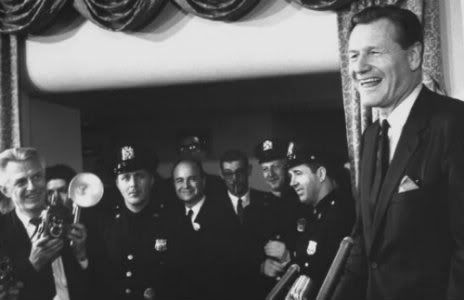
The news that Rockefeller had trounced Knowland in New Hampshire surprised a lot of people. Given the latter’s pivotal role in rebuilding the Republican Party following the destructive Dewey-Taft Feud, experts predicted that he would get the nomination and expected New Hampshirites to get behind him. Instead, voters passed over the conservative Governor of California and awarded victory to the moderate Governor of New York. Rockefeller was understandably ecstatic about winning the first primary; Knowland on the other hand was stunned by his loss. He too thought the state would fall into his pocket.
“How the hell did we lose?” was the question he was asking his campaign team the morning after. The answer: the people of New Hampshire are strongly independent-minded and don’t like being told there is a preordained winner to get behind. When the media in 1960 touted Knowland as likely to win The Granite State, voters rebelled and threw their support behind the non-ordained Rockefeller. Thus, the man who had gone into New Hampshire expecting victory staggered out with a proverbial black eye.
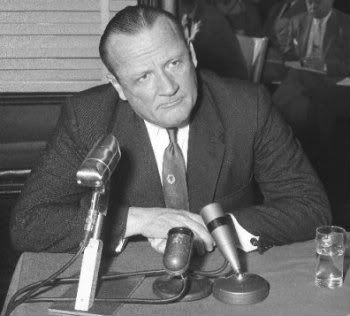
The Republican primaries thereafter became a do-or-die battle between Rockefeller and Knowland. Nelson was determined to build on the momentum he gained from New Hampshire while William was equally determined to knock him down and gain the initiative. While these two contenders duked it out, the Democratic primaries sputtered along. With Byrd unlikely to stage a strong comeback, the Vice President's mission in the primaries was to shut the Virginia Senator down completely. By racking up victories, he wanted to break the South’s mainstream hold over the Party and humiliate the Dixiecrats who were trying to stop him. That Progressive Democrats wanted to use 1960 to wrestle control of the Party away from the South became quite evident when leaders of the liberal wing joined Scoop on the campaign trail. For instance, Humphrey stumped for the Vice President in Wisconsin ahead of her April 5th primary. Looking past Byrd towards the general election, Jackson spent spring preparing for November. For instance, he hired more staffers and expanded campaign infrastructure in must-win states like California and Pennsylvania. Listening to the advice of Secretary of Defense Robert A. Lovett, he recruited Paul Nitze to be his national defense advisor. A Harvard graduate and a banker by trade, Nitze spent World War Two in a variety of government economic posts due to his financial background. After the war, he joined the new Department of Defense and became one of her leading advocates for higher military spending in light of the Cold War. This advocacy made him appealing to Lovett, who in turn suggested to the Vice President that he take a look at him. Jackson did so and liked what he saw: a man of experience and good judgement. As a result, Nitze joined Dean Rusk as one of the men who had Scoop’s ear when it came to forming policies.
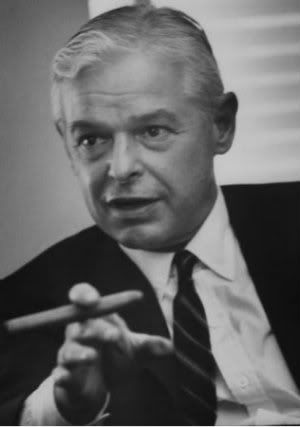
The most important task facing Jackson during this time was his choice of running mate. Historically, running mates are chosen primarily to give the ticket a regional and/or ideological balance and it would be no different in 1960. Initially, the Jackson team scoured the Midwest for good running mates who would make a difference in November. With the Republicans resurging in strength and the South very much in doubt, they felt that in order to win the election they had to carry as much of the American Heartland as possible. The team looked at several candidates including Humphrey of Minnesota (whose politics were very much in line with Jackson’s), Stuart Symington of Missouri (a strong liberal who offended no one), and Frank Lausche of Ohio (a nationally respected figure whose presence on the ticket might swing his big state into the Democratic column). They were all good solid choices…but something kept nagging Scoop and his team during their search. While the open hostility of the Dixiecrats meant no Solid South for the first time since the 1870s, they didn’t speak for everyone. There were plenty of Southerners who considered themselves mainstream Democrats and would probably vote for the Vice President. The question was how to deal with them. The fear was that in this poisonous and divisive atmosphere, picking a Southern running mate might upset Northern Democrats who could see this as a “sell-out”. On the other hand, ignoring the South entirely would offend voters there and cost Jackson valuable votes. Since he needed 269 electoral votes to clinch victory and would probably lose a couple states that Sparkman carried in 1956, he needed to win a few Southern states in order to keep his electoral head above water. It was the simple – if tricky – truth. When campaigning with Humphrey in Wisconsin, the Vice President told him of this dilemma and asked for advice. Hubert told Henry that there was a Southern Democrat who would both be helpful in the region and be acceptable to the North.
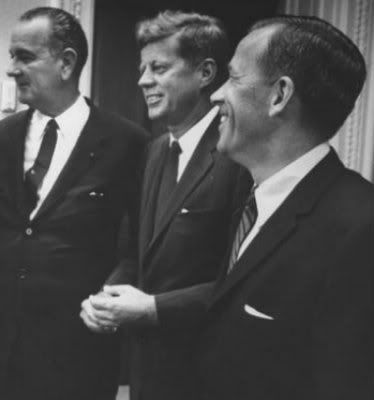
Humphrey of course was referring to Lyndon B. Johnson (pictured above standing to the left of Massachusetts Senator John F. Kennedy during a rare Jackson visit to the Senate in November 1958 following Kennedy's re-election). Ever since he navigated the Civil Rights Act of 1957 through Congress, Johnson’s stock among Northerners had been on the rise. Here was a Southerner who understood their point of view and possessed the clout to make things happen. At the same time, he was careful not to get too far ahead of public opinion and was therefore able to avoid alienating mainstream Southern Democrats. Aside from being a good compromise sectional candidate, LBJ had a few other things going for him as a prospective running mate:
- His rural background and genuine empathy for the less fortunate made him relatable to average Americans
- His belief in using the Federal Government to provide opportunity would come in handy in selling the Fair Deal to the country
- His cozy ties to business interests like the oil and gas industry would provide the Jackson campaign a reliable source of cash
- His clout in Texas was such that he could ensure that the state’s twenty-four electoral votes would land in the Democratic column on Election Day
- His knowledge of how Congress operated was unassailable. Johnson’s advice to Jackson on how to get Congress to enact his agenda would be invaluable – especially if control of it remained divided in 1961
- His volatile personality and tall size (the Texan measured six-feet-four-inches) could be used as a tool of persuasion. If the mellower Jackson wanted to intimidate somebody, he could use Johnson as his “attack dog”
Of course, LBJ also had his negatives. He suffered an inferiority complex which left him paranoid that people of more refined backgrounds than his impoverished upbringing wouldn’t accept him as an equal. This, combined with corruption skeletons in his closet, fueled his ruthless ambition and neverending thirst for power. Some of the people around Jackson feared that if Johnson became Vice President, he would constantly be demanding things to do and would use his office to build a power base for himself that might not operate in the best interest of the Chief Executive. Scoop, who knew LBJ personally and knew what he was capable of, said he understood all this but told his campaign team that Johnson’s strengths outweighed his weaknesses:
“Yes, Lyndon is an S.O.B. There is no question about that. However, he is an S.O.B. who can make deals and get things done. If you want an arm-twister, he is the best at it.”
In early May, Jackson made his decision: the colorful and controversial Senate Majority Leader would be his running mate. Whatever the consequences were resulting from it, he would accept them. After all, it was
his decision.
On a warm May weekend, the Vice President traveled to Johnson’s ranch in Texas. Like Sparkman, he wanted to get this ticket-forming business done early. Stepping out of his car, Scoop watched as Johnson restlessly rode his horse around his property while waving his hat around wildly.
“He even drives his animals hard,” he thought to himself. Spotting his guest, the rider whipped his horse up and charged it full gallop towards the car – only to bring it to a sudden halt just inches from the automobile. The action scared Jackson half to death, giving LBJ a huge laugh as he climbed off his horse:
“What the matter sonny boy? You look like you just pissed yourself.”
While his wife Lady Bird prepared a meal at the house, the Texan took the Washingtonian deer hunting...Johnson style. While taking rifle shots from the vantage point of Johnson’s car (yes, they were shooting off guns while sitting in the car), the Vice President brought up the topic of running mate and offered him the position. He explained that after carefully weighing all his options, he came to the conclusion that he needed Johnson’s legislative skills more than anything else.
“I need you,” he said in a tone calculated to flatter,
“There are things I would like to get done and you are the only one who can knock the right heads together.”
Johnson listened with feign indifference as Jackson laid out the case for having him on the ticket.
“Most Vice Presidents don’t do much,” he responded at one point. Privately, Johnson was ecstatic. His ultimate goal was to become President and he saw the Vice Presidency as a stepping stone. If he was elected Vice President in 1960, LBJ believed he could use that office to position himself to make a serious Presidential run in 1968 (assuming the ticket was re-elected in 1964). A Vice President Johnson would be the frontrunner to beat in eight years if everything went well. However, he remained coy about the job he wanted:
“I need time to think about it.”
Of course he didn’t need time; he merely used it as an excuse to wait things out and see how badly he was wanted. Having made up his mind, Scoop played into LBJ’s hands by promising him power and influence in his Administration. He would be an active Vice President…exactly what Johnson wanted to hear. The Texan remained uncommitted and left his guest hanging until after they ate their post-hunt meal. After the plates had been cleared from the table, Johnson looked straight at Jackson and asked:
“Let me ask you this question, Mr. Vice President: will having me on the ticket be good for the country and good for the Democratic Party?”
When Jackson re-iterated his justification for a Jackson-Johnson ticket, Johnson broke out into a wily grin:
“I want to be Vice President, and if you will have me, I’ll join you in making a fight for your election as President.”
With that, LBJ accepted the running mate position…although the way he did so made HMJ second-guess himself afterwards and wonder if he was getting more than he bargained for.
(From a luncheon in 1956, when then-Senator Jackson little suspected that his political future would one day depend on a man who had no qualms about knocking aside Secretary of Agriculture Harry S. Truman to get the last shrimp)





